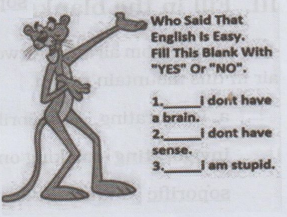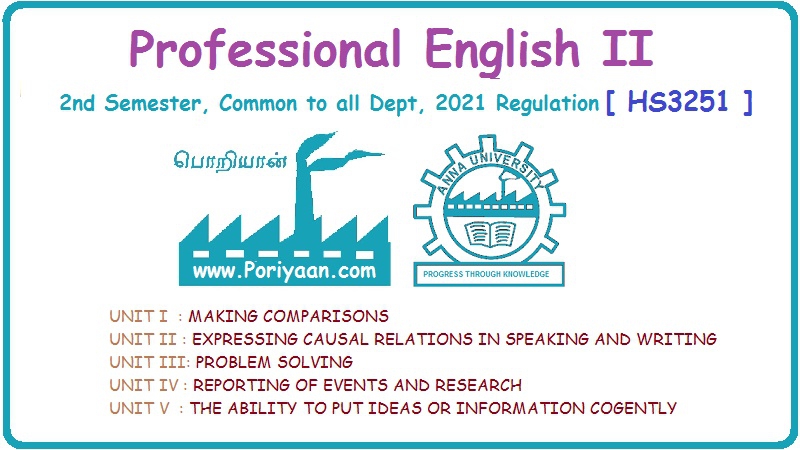Professional English: General Grammar
Sentence Completion
Grammar
A sentence needs a word or phrase or clause to give complete sense. Completing a sentence is one of the frequently asked questions in competitive examinations either for job or for higher studies.
CHAPTER - 5
SENTENCE COMPLETION
A
sentence needs a word or phrase or clause to give complete sense. Completing a
sentence is one of the frequently asked questions in competitive examinations
either for job or for higher studies. This exercise has to be practised
regularly to know the suitability of words. This kind of question is grammar
based or vocabulary based. The blanks in the sentence can be filled with any
part of speech. Some examples are given below for your reference.
Examples
I.
Fill in the blanks with the suitable noun:
He
was treated like a --------- and cast out from his community
a.
Ascetic
b.
prodigy
c.
outcast
d.
tyro
e.
prodigal
Ascetic
means a hermit or sage or a person who has renounced the world.
Prodigy
is a gifted person with extraordinary skills especially at a young age.
Outcast
is the one rejected by the society.
Tyro
means a beginner or novice.
Prodigal
is
wasteful. Prodigal person is a wasteful person.
Hence
the blank has to be filled with 'outcast'
II.
Fill in the blank with suitable noun:
The
teacher accused me of ----------- because my essay was so similar to that of another
student.
a.
procrastination
b.
plagiarism
c.
celerity
d.
confustion
e.
decorum
Procrastination
- delay in action or postponing works
Plagiarism
- copying another person's content without acknowledging emeldon
Celerity
-
swiftness of movement.
Confusion
-
chaos
Decorum
-
etiquette or requirement in behavior and attitude.
Answer:
'Plagiarism' because other choices are not suitable.
III.
Fill in the blanks with suitable adjective:
People
from all over the world are sent by their doctors to breathe the pure, air in
this mountain region.
a.
invigorating
b.
soporific
c.debilitating
d.
insalubrious
e.aromatic.
invigorating
- making one feel strong and vigorous
soporific
- inducing sleep or drowsiness
debilitating
- weakening
insalubrious
- unwholesome
aromatic
-
full of fragrance.
Ans:
'invigorating' is the suitable word. The place is suggested by the doctors and
hence 'making one strong or vigorous must be the suitable word.
IV.
Fill in the blank with suitable verb:
The
revolution in art has not lost its steam; it ------- on as flercely as ever.
a)
Trudges
b)
meanders
c)
edges
d)
ambles
e)
rages
Trudges
-
walks slowly
Meanders
- follows a winding course Eg.river
Edges
- corners
Ambles
-
walks slowly
Rages
- uncontrollably exists
Ans:
'rages' is the correct answer.
V.
Fill in the blank with suitable compound relative pronoun:
-------
comes here is welcome.
a)
Whichever
b)
whomsoever
c)
howsoever
d)
whoever
Ans:
'whoever' is the correct answer.
VI.
Fill in the blank with suitable adverb:
………
the disease has gone into remission. it may not recur.
a)
highly
b)
gladly
c)
thankfully
d)
gracefully
e)
loudly
Ans:
Thankfully' is the correct answer. 'remission' means the severity of the
disease being lessened. The disease may not recur and so thankfully is an apt
word.
VII.
Fill in the blank with suitable preposition:
He
acceded ------ my request.
a)
for
b)
with
c)
beyond
d)
to
e)
by
Ans:
'to', 'acceded' is normally followed by 'to'

Who
Said That English Is Easy. Fill This Blank With "YES" Or
"NO".
1.____
don't have brain.
2.
------ I dont have sense.
3.
---------- I am stupid.
VIII.
Fill in the blank with suitable conjunction:
They
need not endure --------- there is cure.
a)
and
b)
but
c)
or
d)
although
e)
because
Ans:
'because' is the right answer.
IX.
Fill in the blank with suitable interjection:
------
!, we have won the trophy.
a) Oh
b)
Alas
c)
Hush
d)
Hurrah
e)
Hello
Ans:
'Hurrah' is the right answer. 'Hurrah' is an interjection used for joyous
occasions.
X.
Fill in the blank with the suitable option
If
she -------- we would be in trouble.
a)
will find out
b)
found out
c)
finds out
d)
had found out
Ans:
'found out' is the right answer. It is based on one of the three rules of 'if
clauses.
Professional English: General Grammar : Tag: : Grammar - Sentence Completion
Related Topics
Related Subjects
Professional English II
HS3251 2nd Semester 2021 Regulation | 2nd Semester Common to all Dept 2021 Regulation
